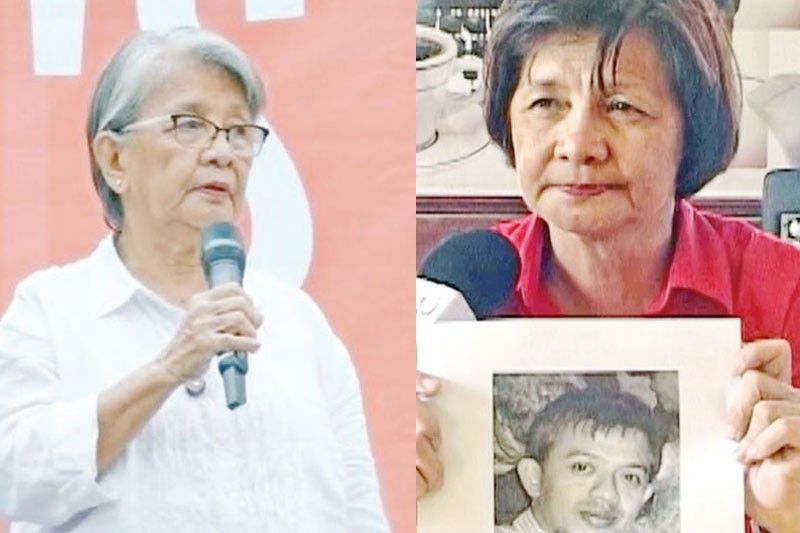Filipino mother's search for missing son in the spotlight

For 17 years, Edita Burgos has looked inside body bags, visited military camps, led street protests, and filed court cases in a desperate search for her missing son Jonas.
He was 37 and a prominent activist for a left-wing farmers group when he was bundled by a group of unknown men into a vehicle at a Manila shopping mall in 2007.
He has not been seen since.
Human rights group Karapatan estimates hundreds of people have gone missing or died in extra-judicial killings since the government began fighting a communist insurgency in the late 1960s.
The military accused Jonas of being a high-ranking communist rebel leader, but have always denied involvement in his disappearance.
Edita, a mother of five, is the protagonist in a new documentary by her youngest son, JL Burgos, that examines Jonas’s abduction and the family’s soul-crushing search for him.
While Jonas’s political views echoed those of the rebels, Edita doesn’t know if her middle son was a communist.
She said it shouldn’t matter anyway.
“Whatever he was, no one has the right to kill somebody, not even a rapist,” Edita, 80, told Agence France Presse ahead of the screening of “Alipato at Muog” (“Spark and Fortress”) at the country’s independent film festival Cinemalaya earlier this month.
“You have to take them to court, not make them vanish.”
No one has ever been convicted over Jonas’s abduction, despite the Court of Appeals, Supreme Court and the independent Commission on Human Rights finding that members of the military were involved.
An army major was arrested in 2013 and put on trial for the alleged arbitrary detention of Jonas, but he was acquitted in 2017 after a key witness failed to testify.
JL, 50, said he was “haunted” by his older brother’s disappearance and suffered a “breakdown” as he worked on the documentary for over eight months.
He hoped the film would prompt someone to come forward with information about Jonas’s whereabouts — even if it were just his remains.
“Logically, he should no longer be alive, but then we cannot prove that,” said JL.
Edita, a widow of an outspoken critic of former dictator Ferdinand Marcos Sr., has sought the help of presidents and military generals, and even the communist rebels’ urban death squad, in her search for Jonas.
She’s still waiting for answers.
Jonas, who briefly trained in his early teens to become a priest, had been helping people in poor rural villages in Bulacan province when he was abducted in Manila.
Edita has long blamed an army battalion operating in the province for her son’s disappearance.
In the film, Edita is seen visiting the unit’s headquarters in Bulacan where she is told that the number plate of a van earlier seized and impounded by soldiers had been stolen.
The same number plate was seen on the vehicle used in the abduction of Jonas.
Edita has accused Eduardo Ano, who was a military intelligence officer at the time, of being the “mastermind” of her son’s disappearance.
Ano, who was later promoted to the head of the military and is now the national security adviser to President Ferdinand Marcos Jr, the son and namesake of the ex-dictator, has denied involvement.
The documentary was a “desperate attempt to revive an old case linking the military to the disappearance of Jonas Burgos,” Jonathan Malaya, spokesman for the National Security Council, told AFP.
The criminal cases have all been “dismissed for lack of merit,” while the allegations of Ano’s alleged involvement “are a rehash of old accusations that have never been proven nor supported by facts or evidence,” Malaya said.
Edita, meanwhile, lives with the pain of not knowing what happened to her son.
“You can’t even pray and say ‘May his soul rest in peace’ because you do not know if he’s still there.”
Forced disappearances have continued under the administration of Marcos Jr, who took power in 2022, Karapatan secretary-general Cristina Palabay told AFP.
Thirteen activists have gone missing during Marcos Jr.’s term, taking the group’s tally to 1,913 since the start of the communist insurgency during the elder Marcos’s rule more than five decades ago.
That does not include the many victims of suspected extra-judicial killings in that time.
“(It’s) a strategy to quell dissent,” Palabay told AFP.
“You don’t see a tombstone, and you do not have closure as a family. It has a longer-lasting impact that extends to the community. There’s a strong message that ‘If you do this, this will happen to you and your family,’” she said.
Edita said Marcos Jr. had a responsibility to find out what happened to her son and other victims of forced disappearances.
“He should really address human rights,” Edita said, “because it was his father who set the tone that led us to a culture of violence among the uniformed ranks.”
As the years go by with no news of her son, Edita said there was still hope in her heart that one day he would be found.
“For all we know they could just be hiding him,” Edita said.
“Who knows, one of these days I will hear somebody knocking and asking, ‘Mummy, what’s for dinner?’”
- Latest
- Trending































